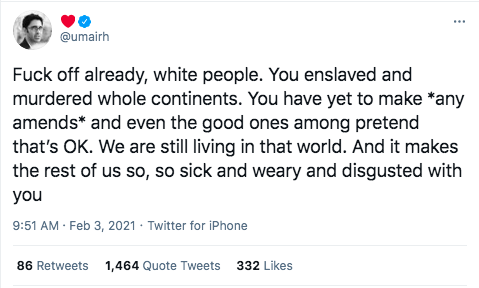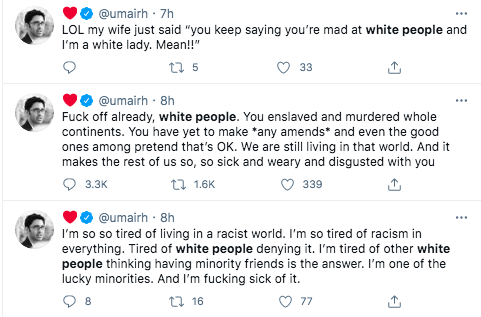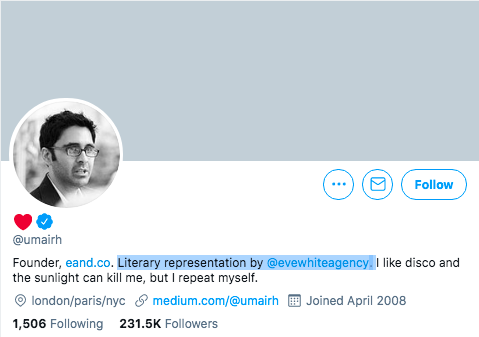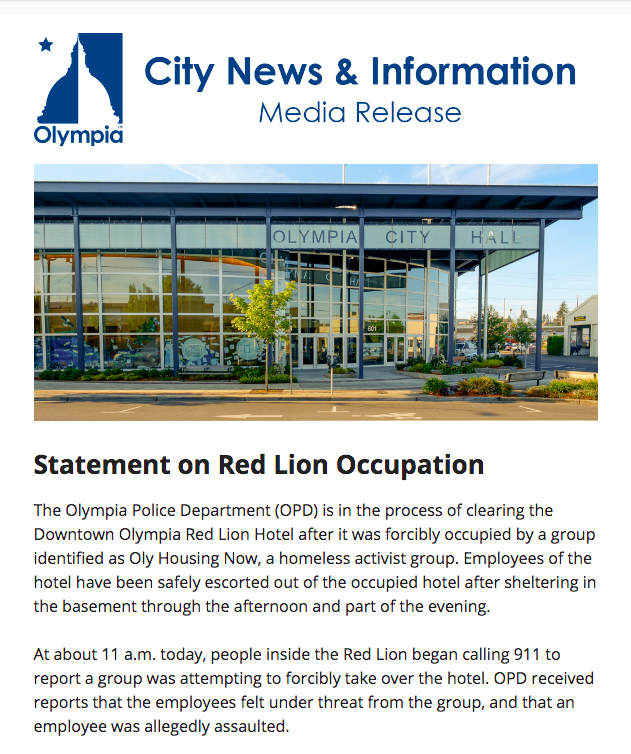
If you’ve ever read, watched, or listened to a one-sided article, social media post, news segment, video, podcast, etc. presenting a black & white narrative and felt that something seemed off, it’s because something was. ↓
Anyone telling a black & white story is presenting only a piece of a puzzle.
Even in cases where there seem to be obvious “good guys” and “bad guys” there’s always nuance to any occurrence. ↓
Even in cases where there seem to be obvious “good guys” and “bad guys” there’s always nuance to any occurrence. ↓
There are at least two sides to every story—more if there are groups of people involved in the story or if there are witnesses.
A story lacking in nuance is nothing more than a one-dimensional story. ↓
A story lacking in nuance is nothing more than a one-dimensional story. ↓
There may or may not be truth within that story.
Some stories are entirely fabricated, some are manipulated from real events, others may be closer to what actually occurred. ↓
Some stories are entirely fabricated, some are manipulated from real events, others may be closer to what actually occurred. ↓
Even if a story comes from someone you like and trust or from a stranger who seems sympathetic or is about something you agree on, it’s important to be wary of black & white narratives.
Life is rarely—perhaps never—that simple. ↓
Life is rarely—perhaps never—that simple. ↓
This #MediaLiteracy thread will go over how to evaluate stories and why it matters when stories are elevated without evidence. ↓
When a crime has been committed an investigation will be conducted by law enforcement and if enough evidence is found, the question of finding the truth will play out in court. ↓
But with social media, anyone can tell a story about events which may or may not have happened in an attempt to garner attention, sympathy, friends, job opportunities, money, and power. ↓
Stories are NOT evidence.
Stories lacking in concrete evidence should -always- give you pause.
Even stories presented with what is claimed to be hard evidence should be questioned (more on why below). ↓
Stories lacking in concrete evidence should -always- give you pause.
Even stories presented with what is claimed to be hard evidence should be questioned (more on why below). ↓
Depending on what a story alleges, evidence may include:
- uncut video or audio recordings
- photos
- pdfs or webpages of unedited original documents (emails, reports, etc.)
- social media posts (or archives of deleted posts)
- confirming narratives from uninvolved witnesses
↓
- uncut video or audio recordings
- photos
- pdfs or webpages of unedited original documents (emails, reports, etc.)
- social media posts (or archives of deleted posts)
- confirming narratives from uninvolved witnesses
↓
Not hard evidence:
- firsthand recount of an occurrence with no supporting documents or uninvolved witnesses to corroborate
- second or thirdhand recount of an occurrence (rumors)
- discussion of what an involved party “believes” or “feels”
- firsthand recount of an occurrence with no supporting documents or uninvolved witnesses to corroborate
- second or thirdhand recount of an occurrence (rumors)
- discussion of what an involved party “believes” or “feels”
(Not hard evidence continued:)
- out of context quotes
- out of context video clips
- cropped photos
- screenshots of social media posts (these can be easily faked)
↓
- out of context quotes
- out of context video clips
- cropped photos
- screenshots of social media posts (these can be easily faked)
↓
I have gotten kudos for my deep-dive investigative threads. I’m always a little uncomfortable with this because I don’t feel like what I do is rocket science. ↓
It does take time to do the kind of fact checking I do and then write everything up, but taking a step back, asking questions, and fact checking should be something that everyone is in the habit of doing. ↓
If you don’t have time, doing this for even a minute in some cases can save you from spreading misinformation or embarrassing yourself. ↓
https://twitter.com/MrSilva/status/1362466088601149445
It’s everyone’s job to combat misinformation, disinformation, and mal-information and that starts with being an educated consumer of content and being ready to question content even if it confirms your biases. ↓
firstdraftnews.org/latest/informa…
firstdraftnews.org/latest/informa…

You don’t do yourself or the people around you any favors by being credulous, and spreading stories that may be false, whether you’re someone with a large or small platform. ↓
Even if you don’t have a large platform, if your sharing is amplified by someone with a larger platform, you can go viral in a matter of hours. (I’m speaking from experience.) ↓
All content that you read, watch, and listen to should be on the table to be questioned.
You will naturally be skeptical of information that comes from someone you don’t know, an organization you don’t trust, or if it’s about something you just don’t believe. ↓
You will naturally be skeptical of information that comes from someone you don’t know, an organization you don’t trust, or if it’s about something you just don’t believe. ↓
You will naturally be skeptical of information that comes from someone you don’t know, an organization you don’t trust, or if it’s about something you just don’t believe. ↓
But it’s not disloyal to question information coming from people/orgs you know/trust or about things you believe to be true.
If someone has made an error, is intentionally misleading, is abusing people’s trust—they must be corrected and held accountable for that. ↓
If someone has made an error, is intentionally misleading, is abusing people’s trust—they must be corrected and held accountable for that. ↓
Unfortunately, corrections never get shared as widely, which is why it’s so important to know how to fact check.
Once a false story is out there, it can become a legend. ↓
Once a false story is out there, it can become a legend. ↓
While there are many ways to misinform people, the one-sided black & white narrative should be the easiest to question but so often people fall for these stories for a number of reasons. ↓
Sometimes a story is being told or framed by someone else with a bigger platform—a media outlet publishing a story, a journalist using their own social media, or a pundit or celebrity sharing a story. ↓
The frame that these third parties put on a story may have some of the same problems as the original story, but they may also get details wrong, introducing errors and changing the story into something it’s not. ↓
Questions to ask when you’re looking at content that is showing only one side:
- What is the other side of the story?
If more than 2 individuals are involved you should be asking about all the missing sides.
↓
- What is the other side of the story?
If more than 2 individuals are involved you should be asking about all the missing sides.
↓
- What are we not being told by the storyteller or third party sharers?
↓
↓
- Why are we not being told the rest?
Sometimes this may be as simple as someone not responding to a journalist before deadline or refusing to comment. Other times there may be an intent to mislead.
↓
Sometimes this may be as simple as someone not responding to a journalist before deadline or refusing to comment. Other times there may be an intent to mislead.
↓
- How likely is it that what is being presented is true?
If aspects of the story don’t make sense, drill down on that. You may be able to find confirming or disconfirming info with a quick search. It may have been left out of one story for length/time or to mislead.
↓
If aspects of the story don’t make sense, drill down on that. You may be able to find confirming or disconfirming info with a quick search. It may have been left out of one story for length/time or to mislead.
↓
- Does the story include cognitive distortions?
- Is the storyteller or sharer trying to emotionally/psychologically manipulate the audience?
Someone looking to mislead intentionally may use emotional manipulation and cognitive distortions to bring the audience along.
↓
- Is the storyteller or sharer trying to emotionally/psychologically manipulate the audience?
Someone looking to mislead intentionally may use emotional manipulation and cognitive distortions to bring the audience along.
↓
If you spot cognitive distortions or manipulation, that’s a red flag.
en.wikipedia.org/wiki/Cognitive…
↓
en.wikipedia.org/wiki/Cognitive…
https://twitter.com/keikoinboston/status/1049806564666863619
↓
How to Recognize the Signs of Emotional Manipulation and What to Do
healthline.com/health/mental-…
Theories of psychological manipulation:
en.wikipedia.org/wiki/Psycholog…
↓
healthline.com/health/mental-…
Theories of psychological manipulation:
en.wikipedia.org/wiki/Psycholog…
↓
- If a story requires some expertise or niche knowledge to understand, do you know someone with the relevant expertise, experience, or membership in a community to ask what they think about the story? ↓
This doesn’t always work because everyone has biases and if there’s limited information about the story, they’ll be working with the same lack of info you are. But expertise may allow them more educated speculation than you can manage on your own. ↓
I find that talking to an expert or someone with a connection to a community helps me formulate questions I didn’t know enough to ask. They may also be able to fill me on procedures or other aspects of the story that I don’t understand that require specialized knowledge. ↓
When I can’t find anyone to talk to I look for public takes from possible experts. This isn’t always that helpful but sometimes I can find a good thread, an op-ed, or a YouTube or TikTok video that provides a third party insider perspective. ↓
Third party perspectives may not directly address the above questions but may offer enough perspective to understand how much is missing from the original one-sided story. ↓
Of course in most cases answers to all questions won’t be available. ↓
Records may be private/confidential and may never be publicly released.
Organizations may be unable to say more for legal or policy reasons. They may be prevented by their internal policies, specific laws, or ongoing litigation or the threat of litigation. ↓
Organizations may be unable to say more for legal or policy reasons. They may be prevented by their internal policies, specific laws, or ongoing litigation or the threat of litigation. ↓
Other involved individuals and bystanders may be unwilling to come forward and share what they believe they know. ↓
Evidence can be fabricated, falsified, manipulated, or framed with misleading context.
Source for infographic: firstdraftnews.org/latest/informa…
↓
Source for infographic: firstdraftnews.org/latest/informa…
↓

Evidence can also be missing so that the evidence that is presented shows the story in the light that the storyteller wants it to be told, leaving out key aspects they don’t want the public to know. ↓
If someone considered to be trustworthy boosts a story, it is more likely to be shared because of who shared it.
If you see that lots of their friends have shared a story, you may mistakenly assume that they have all done their homework. ↓
If you see that lots of their friends have shared a story, you may mistakenly assume that they have all done their homework. ↓
In reality, no one has stopped to ask questions and do additional research.
This is how you get viral social media posts with completely false info.
Retweets and shares function like a modern chain letter—they go on until someone breaks the chain. ↓
This is how you get viral social media posts with completely false info.
Retweets and shares function like a modern chain letter—they go on until someone breaks the chain. ↓
In order to combat bad information and not amplify people looking to package stories for the public to elevate their own profile and increase their personal power, everyone needs to make a commitment to questioning stories and fact checking. ↓
This is a conscious habit that needs to be developed until it becomes automatic.
Please take the time to ask questions, even if only in your head.
Being first to jump on a bandwagon isn’t always best. If the wagon is headed of a cliff, better not to get on. ◆
Please take the time to ask questions, even if only in your head.
Being first to jump on a bandwagon isn’t always best. If the wagon is headed of a cliff, better not to get on. ◆
• • •
Missing some Tweet in this thread? You can try to
force a refresh













